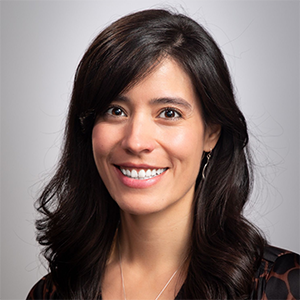Note: Dr. Gurule and UNM Health acknowledge that some patients prefer to say “chestfeeding” or “providing human milk,” and that these are interchangeable terms. For simplicity, this article uses the term “breastfeeding.”
At The University of New Mexico Hospital, Sevy Gurule, MD, a family medicine doctor in the Department of Family and Community Medicine, stands at the unique intersection of care, helping both new parents and newborns navigate the challenges and rewards of breastfeeding. As someone who has breastfed her own children, Gurule understands firsthand the dedication and resilience required, particularly for mothers facing health conditions such as diabetes.
“Breastfeeding is really hard,” Gurule says, drawing on her experiences as both a physician and mother. “I hear a lot of people say it's natural, but it’s more like learning to walk. You fall, you get back up, and you practice until it becomes second nature.”
For Myrna Vargas, a recent UNM Hospital patient, breastfeeding her son Cassius has been an unexpected journey. Diagnosed with gestational diabetes during pregnancy, she thought she was prepared for breastfeeding but soon found it to be more challenging than anticipated.
“I thought he was going to latch on right away. But he was not,” Vargas shares. “So now I exclusively pump and give him a bottle of breastmilk. It’s a journey on its own.”
Gurule emphasizes that breastfeeding brings many health benefits to both mother and child.

For the mother, breastfeeding can reduce the risk of ovarian and breast cancers, as well as hypertension and diabetes. For babies, breastmilk strengthens their immune systems and decreases their risk of obesity, which is important for reducing the risk of diabetes later in life.
Gestational diabetes, as Vargas experienced, can increase a mother’s risk of developing type 2 diabetes post-pregnancy. Breastfeeding, however, can serve as a preventive tool.
“Breastfeeding is especially important for women with gestational diabetes because it further reduces their risk of developing type 2 diabetes later on,” Gurule says.
Yet, the journey isn’t without its hurdles. People with diabetes may face additional challenges with milk supply, especially when diabetes is accompanied by conditions like polycystic ovary syndrome (PCOS) or hypothyroidism. Gurule notes the importance of individualized support for these mothers
“We might need to meet with them more frequently and check their baby's weight more often, but it is absolutely possible to breastfeed exclusively with diabetes,” she reassures.
Vargas recalls how critical support from the UNM Hospital team was during her early days with Cassius.
“Dr. Gurule was very helpful in the journey, reassuring me that no matter what happens, it's going to be okay.”
The hospital provided a range of resources, from lactation consultations to donor milk, which made a significant difference as Vargas worked to establish her milk supply.
UNM Hospital is committed to being a breastfeeding-friendly hospital, promoting practices like the "golden hour" of bonding immediately after birth and offering extensive lactation support. Gurule stresses the importance of recognizing breastfeeding as a human right.
“Breastfeeding isn’t a luxury, and it shouldn’t be treated as such,” she says, urging society to eliminate stigmas that can burden breastfeeding parents, such as trying to feed their child in public or maintaining their milk supply in the workplace. “It's so important that we support these parents, because such stigmas can really impact their ability to reach their breastfeeding goals.”
As Vargas reflects on her journey, she encourages other parents to take it “day by day,” recognizing that every journey is unique. “The important thing is that your baby is healthy. If it’s exclusively pumping, breastfeeding, or formula feeding, you’re not a bad person. It’s okay,” she says. “You know your body... You're going to find your routine and you'll be all right.”
UNM Hospital offers a wealth of support for breastfeeding parents, with resources available before, during, and after childbirth. For those facing additional health challenges like diabetes, the hospital’s commitment to individualized care and accessible resources helps ensure every family has the support they need on their journey.
